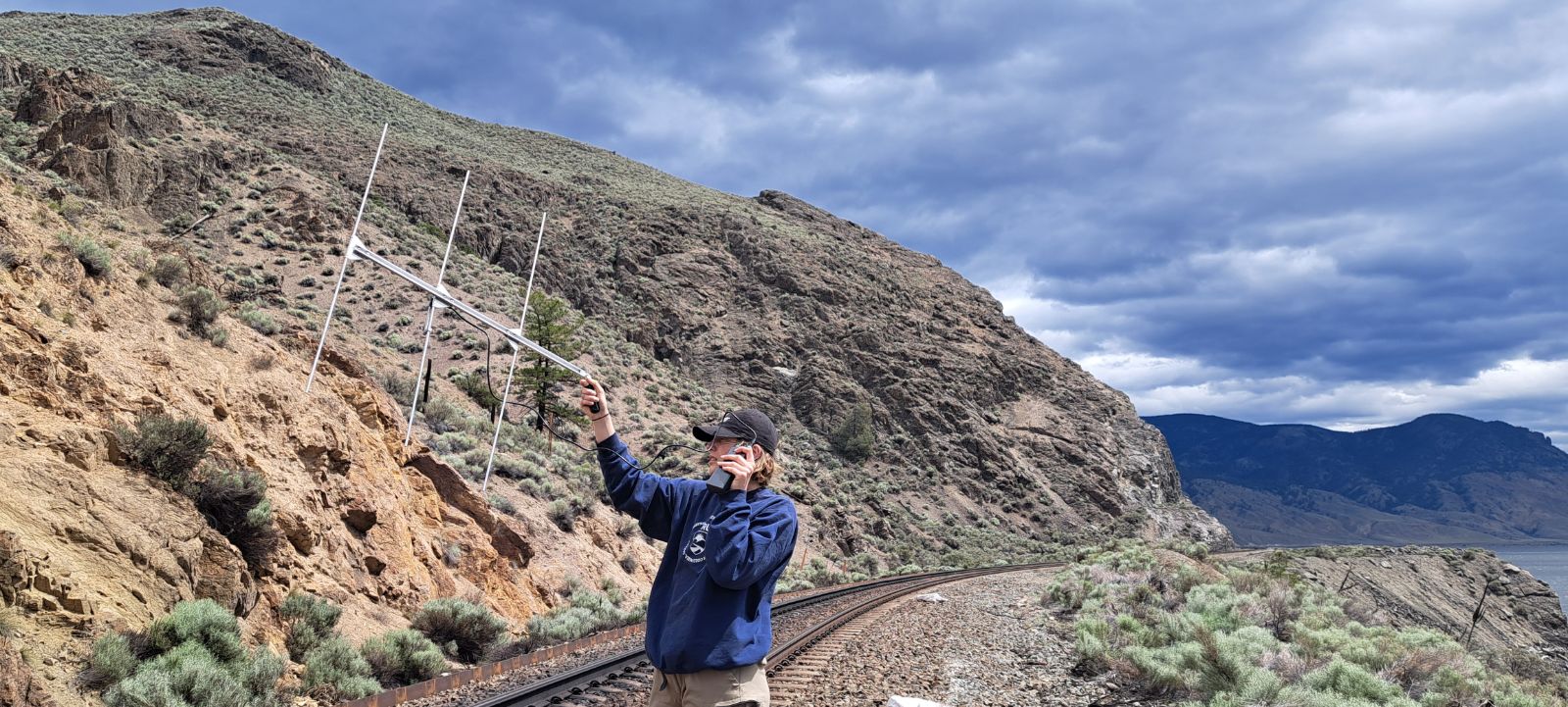By Caitlin McKinlay
Thompson Rivers University (TRU) graduate student Larisa Murdoch’s passion for ecological conservation began after a trip to study African wild dogs’ denning habits. A two-month undergraduate field study took her to the Southern Hemisphere in 2022 to study the painted wolves, a wild canine native to sub-Saharan Africa.
Murdoch enjoyed the nature of the project so much that she was determined to continue her studies in wildlife conservation. In 2023, she began her master’s in environmental science under the supervision of Dr. Karl Larsen. What started as a job as the wildlife technician tracking the elusive forest-dwelling fisher quickly transitioned into a master’s research project on BC’s bighorn mountain sheep.
“Larisa and her project are linking together a number of stakeholders, including the provincial government, not for profits and First Nations that have a vested interest in the bighorn sheep herds in this region. Her dedication to the project provides much-needed steering and organization,” said Larsen.
Through partnerships with the Ministry of Water, Land and Resource Stewardship, Wild Sheep Society of BC and the Skeetchestn Indian Band, Murdoch is helping investigate poor lamb recruitment and the drastically decreasing population of sheep around Kamloops, including herds around Sun Rivers, Deadman Creek and Kamloops Lake.

Larisa Murdoch tracking mountain sheep.
“A lamb is born, and if it makes it through that first year, it can be considered to have been recruited. If too few lambs are recruited, the herd declines. They ruled out any major health issues and lack of nutrition, but that didn’t answer what was happening,” said Murdoch.
“Larisa is tackling some very basic, critical and unanswered questions that are pertinent to our understanding of how the environment and the ewes are interacting and how that may be influencing recruitment into the herds,” said Larsen.
Murdoch works closely with her research partners to investigate habitat conditions and the sheeps’ vulnerability to predators. They spend much of their time counting sheep, monitoring their movements with tracking devices and accessing rugged terrain on foot or by boat to assess habitat conditions.
Along with spending time in the field, Murdoch is learning to use geographic information systems with Dr. David Hill, an associate professor of geography at TRU. This technology allows researchers to take their data from the field and input it into digital maps so they can layer all the information they have collected while tracking the sheep.
Scholarship aids conservation research
Murdoch is also working with TRU’s Dr. Lauchlan Fraser to study cheatgrass, a highly invasive, low-nutrient grass that has invaded the sagebrush ecosystem around Kamloops. Murdoch and her peers are trying to determine whether the grass is affecting the sheeps’ food source or habitat, to see if that has any impact on the lamb recruitment for the declining herds.
Murdoch recently received a $20,000 award from the Habitat Conservation Trust Foundation’s (HCTF) Together for Wildlife Scholarship. HCTF is a non-profit organization with a mission to improve the conservation outcomes of BC’s fish and wildlife and the habitats in which they live.
“I am so grateful. I want to do all this good work and I am passionate, and it means so much to me because I want to be an influential member of this scientific community,” said Murdoch.
In partnership with the First Nations-B.C. Wildlife and Habitat Conservation Forum and the BC government, HCTF announced this year’s Together for Wildlife Scholarship recipients in July. Awards went to 10 master’s degree and PhD candidates across BC who are conducting applied research that will make positive impacts in the areas of stewardship, management, policy or decision-making related to wildlife and wildlife habitats.
“I think a part of me is still shocked. It is a good reminder to continue to do good work because it honours and commemorates influential people in wildlife conservation,” said Murdoch. “In the end, all we want is to make this a better place. We want people to be able to enjoy the wildlife and the landscape. I think being able to share that with other people is really important, and the enthusiasm is infectious.”
Advancing conservation for generations
The scholarships also support reconciliation and collaboration with First Nations, encourage a diversity of perspectives on wildlife stewardship and build capacity for wildlife stewardship work within Indigenous communities and rural areas of BC. The HCTF scholarship grant programs aim to build experience, knowledge and skills in the next generation of collaborative and conservation leaders so that they can support each other and advance the field.
Murdoch is still determining where her career will take her after graduation, but she knows she wants to travel and continue working in wildlife conservation.
Larisa Murdoch is the second TRU graduate student to receive the Together for Wildlife Scholarship. Lindsay Whitehead was awarded last year for her research on the effects of natural disturbances — particularly wildfires — on the Western rattlesnake population.
“As a supervisor to Larisa and other MSc students, I am responsible for ensuring they have an income that will cover their cost of living: tuition, rent, food, etc.,” said Larsen. “With these costs rising each year, funding to the students becomes more critical and a bit more difficult to cobble together. The Together For Wildlife scholarship provides a much-needed addition to Larisa’s income and will allow her to concentrate on her studies.”
Learn more about the Together for Wildlife Scholarship Program
Learn more about the Together for Wildlife Strategy

